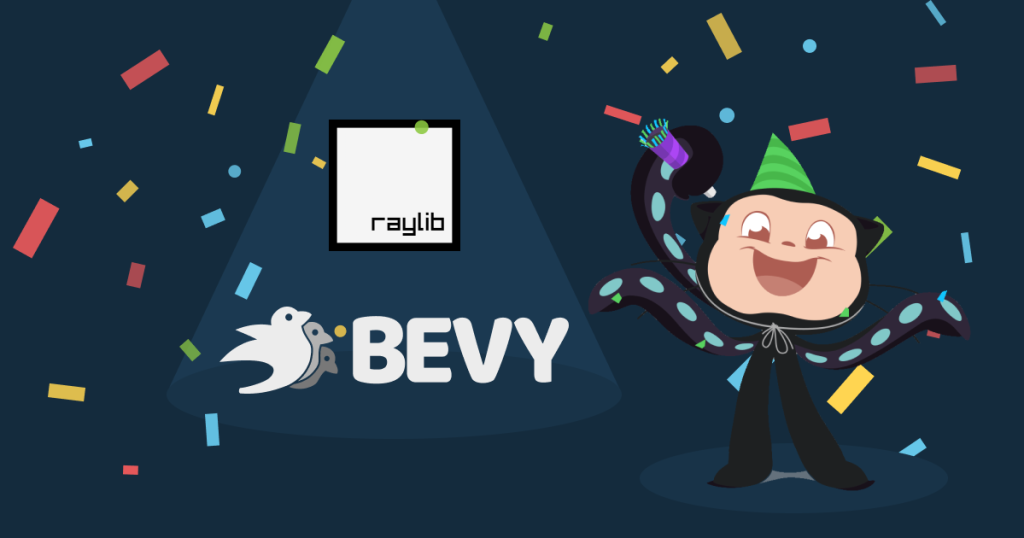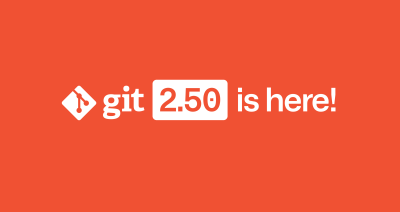Lee Reilly
Senior Program Manager, GitHub Developer Relations. Open source hype man, AI whisperer, hackathon and game jam wrangler. I write && manage programs, support dev communities, and occasionally ship something weird just for the vibes.
Game Bytes is our monthly series taking a peek at the world of gamedev on GitHub—featuring game engine updates, game jam details, open source games, mods, maps, and more. Game on!


Bevy (previously on Game Bytes), a cross-platform game engine built in Rust, is celebrating the third anniversary of its initial public release. The Bevy team is also taking the opportunity to reflect on what the community has achieved and how to reach their goals in the year ahead. Bevy’s project lead has written thoughtfully about what the Bevy team did, how it compared to expectations, and invited others to do the same. Join them in celebrating another year of hard work and getting excited about the road ahead. 🥳
RayLib (previously on Game Bytes), a minimalist game engine that lets you bring your own editor, debugger, and other tools, is celebrating ten years of development. To look back on the project’s first ten years, there’s now an interactive, animated timeline. Now, you can experience RayLib’s journey, from its origins as a forum post asking for a simple OpenGL library (with the iconic follow-up message, “As I couldn’t find the lib I was asking for, I created it!”) to racking up GitHub stars in the present day. Congrats to RayLib—we can’t wait to see what’s next! 👏
Wipeout was a high-speed racing game for the original PlayStation console and now Wipeout’s back in your browser, as a feat of video game restoration from @phoboslab (Dominic Szablewski). Szablewski got the game compiled and running on modern hardware, but the work didn’t stop there. What followed was a more-or-less complete rewrite of Wipeout, reimplementing rendering physics, game loops, UI, and more. Learn more about how this classic was restored and rewritten in Szablewski’s extensive write-up, or head on over to the racetrack.
Quake II is id Software’s classic 1997 first-person shooter, which was recently remastered and rereleased for PC and consoles. Alongside the rerelease, id has published DLL source code to support updating existing mods and bringing new ones to the game. Not only is the source shared on GitHub, a deep dive article paired with the project README, makes for an in-depth look into how the original source was adapted to support the remaster’s new features and improvements. Read the release notes or visit the repository before your return to Stroggos.
Jupiter Hell pits you against a never-ending horde of monstrosities in a “VHS era” turn-based shooter and the successor to DRL, an opensource roguelike inspired by id Software’s Doom. A recent update to Jupiter Hell introduces modding to the game: documentation and sample code are now shared on GitHub. To learn more about the game and modding it, read the Jupiter Hell 1.7 release announcement.
VCMI (previously on Game Bytes) is the opensource recreation of Heroes of Might and Magic III, a classic of the turn-based strategy game genre. VCMI has landed yet another significant release. This time, the team has rolled out several quality-of-life improvements, such as a scalable user interface, new touchscreen interfaces and gestures, and opponent AI fixes. Read the VCMI 1.3 announcement to learn more.
DEMoCap has reached version 1.0, after an early access period. The tool uses VR hardware to capture motion, providing a lower-cost option than motion capture-specific hardware. It also creates an immersive environment for actors, since they can see the scene in real time. You can use the resulting animations in the accompanying Drag[en]gine Game Engine or export to Blender. Learn more about this project from the release announcement or the repository on GitHub.
AMD’s FidelityFX SDK provides shader and runtime code for image quality effects for DirectX 12 and Vulkan, such as super resolution, adaptive sharpening, ambient occlusion, and others. With an open source release, AMD is trying to make it easier for developers to integrate these effects into their engines. Read the FidelityFX SDK announcement to learn more (and take in some impressive screenshots).
Test your skills or learn something new with one of these upcoming game jams:
Q1K3 is our game jam game of the month because it ties everything together. Q1K3 is the work of @phobslab (Dominic Szablewski) (the author of the Wipeout rewrite), an entry to the 2021 js13kGames jam (the 2023 jam is currently running), and an homage to id Software’s Quake (the predecessor to Quake II).
Almost by magic, Q1K3 captures the feel of the original Quake with the simplest models, textures, sound, and music. In just 13 kilobytes it manages to include dynamic lighting, enemy AI, multiple levels, enemies, and weapons, and much more. Play it in your browser then read the author’s delightful making-of article. Dominic walks you through the many challenges and clever solutions to packing Quake into just 13k.
That’s all for this edition of Game Bytes. We’ll see you next month!
Working on something cool or releasing something this month? Share it with us via gamebytes@github.com.

Today, the Git project released new versions to address seven security vulnerabilities that affect all prior versions of Git.

The open source Git project just released Git 2.50. Here is GitHub’s look at some of the most interesting features and changes introduced since last time.

Get insights on the latest trends from GitHub experts while catching up on these exciting new projects.